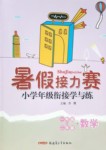题目内容
—We’ve only got this small bookcase―will that do?
—No._____ I was looking for was something much bigger and stronger.
A.What B.Where C.That D.Which
练习册系列答案
 桃李文化快乐暑假武汉出版社系列答案
桃李文化快乐暑假武汉出版社系列答案 优秀生快乐假期每一天全新寒假作业本系列答案
优秀生快乐假期每一天全新寒假作业本系列答案 暑假接力赛新疆青少年出版社系列答案
暑假接力赛新疆青少年出版社系列答案
相关题目
假设你是红星中学高三(1)班的学生李华,校报英文版正在开展“续写雷锋日记”活动。请根据以下四幅图的先后顺序,将你所做的一件好事以日记形式记述下来,向校报投稿。
注意:1.日记的开头已为你写好。[来%^~源&:中#教网]
2.词数不少于60。
|
Saturday, May 3 Fine
This morning, ________________________________________________________
_________________________________________________________________________
_________________________________________________________________________
_________________________________________________________________________
_________________________________________________________________________
_________________________________________________________________________


